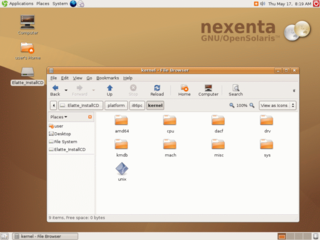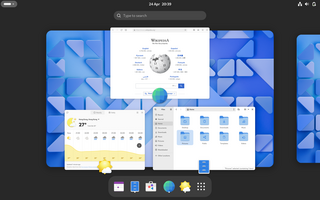
GNOME Evolution is the official personal information manager for GNOME. It has been an official part of GNOME since Evolution 2.0 was included with the GNOME 2.8 release in September 2004. It combines e-mail, address book, calendar, task list and note-taking features. Its user interface and functionality is similar to Microsoft Outlook. Evolution is free software licensed under the terms of the GNU Lesser General Public License (LGPL).

Ubuntu is a Linux distribution derived from Debian and composed mostly of free and open-source software. Ubuntu is officially released in multiple editions: Desktop, Server, and Core for Internet of things devices and robots. The operating system is developed by the British company Canonical and a community of other developers, under a meritocratic governance model. As of October 2024, the latest interim release is 24.10, with most-recent long-term support release is 24.04.
Domain Technologie Control (DTC) was a web hosting control panel aimed at providing a graphics-oriented layout for managing commercial hosting of web servers, intended for shared web hosting servers, virtual private servers (VPSes), and dedicated servers. Domain Technologie Control is free software released under the GNU LGPL v2.1 license. It is fully skinnable and translated into several languages.

Postfix is a free and open-source mail transfer agent (MTA) that routes and delivers electronic mail.
Technical variations of Linux distributions include support for different hardware devices and systems or software package configurations. Organizational differences may be motivated by historical reasons. Other criteria include security, including how quickly security upgrades are available; ease of package management; and number of packages available.

Dovecot is an open-source IMAP and POP3 server for Unix-like operating systems, written primarily with security in mind. Timo Sirainen originated Dovecot and first released it in July 2002. Dovecot developers primarily aim to produce a lightweight, fast and easy-to-set-up open-source email server.

A LAMP is one of the most common software stacks for the web's most popular applications. Its generic software stack model has largely interchangeable components.

Nexenta OS, officially known as the Nexenta Core Platform, is a discontinued computer operating system based on OpenSolaris and Ubuntu that runs on IA-32- and x86-64-based systems. It emerged in fall 2005, after Sun Microsystems started the OpenSolaris project in June of that year. Nexenta Systems, Inc. initiated the project and sponsored its development. Nexenta OS version 1.0 was released in February 2008.
The comparison of mail servers covers mail transfer agents (MTAs), mail delivery agents, and other computer software that provide e-mail services.
vsftpd is an FTP server for Unix-like systems, including Linux. It is the default FTP server in the Ubuntu, CentOS, Fedora, NimbleX, Slackware and RHEL Linux distributions. It is licensed under the GNU General Public License. It supports IPv6, TLS and FTPS.

ISPConfig is an open source hosting control panel for Linux, licensed under BSD license and developed by the company ISPConfig UG. The ISPConfig project was started in autumn 2005 by Till Brehm from the German company projektfarm GmbH.
The following sections compare general and technical information for a variety of web hosting control panel software packages.

Ubuntu releases are made semiannually by Canonical Ltd, its developers, using the year and month of the release as a version number. The first Ubuntu release, for example, was Ubuntu 4.10 and was released on 20 October 2004. Consequently, version numbers for future versions are provisional; if the release is delayed until a different month than planned, the version number will change accordingly.

Ubiquity was the default installer for Ubuntu and its derivatives. It is run from the Live CD or USB and can be triggered to run from the options on the device or on the desktop of the Live mode. It was first introduced in Ubuntu 6.06 LTS "Dapper Drake". At program start, it allows the user to change the language to a local language if they prefer. It is designed to be easy to use.
The Linux Schools Project is an operating system designed for schools. It is a Linux distribution based on Ubuntu. The project maintains two custom distributions, with one designed for use on servers and the other for use with the server version on client machines. The server distribution is the official Karoshi, while the client is known as Karoshi Client.

GNOME originally an acronym for GNU Network Object Model Environment, is a free and open-source desktop environment for Linux and other Unix-like operating systems.

AlternC is a set of open-source Web Hosting server management software for Linux/UNIX-like systems, whose aim is to promote self hosting by individuals or small structures, and provide its users with an easy web-based interface to manage a web and mail server.
Long-term support (LTS) is a product lifecycle management policy in which a stable release of computer software is maintained for a longer period of time than the standard edition. The term is typically reserved for open-source software, where it describes a software edition that is supported for months or years longer than the software's standard edition.

Rudder is an open source audit and configuration management utility to help automate system configuration across large IT infrastructures. Rudder relies on a lightweight local agent installed on each managed machine.

Ispmanager is commercial web server and website panel control panel. It permits working with services without using a command line or manual settings. The product supports a wide range of functions and has a visual interface designed with WCAG. Ispmanager supports servers based on Linux distributions and can be installed on both physical servers and virtual machines (VPS/VDS).











